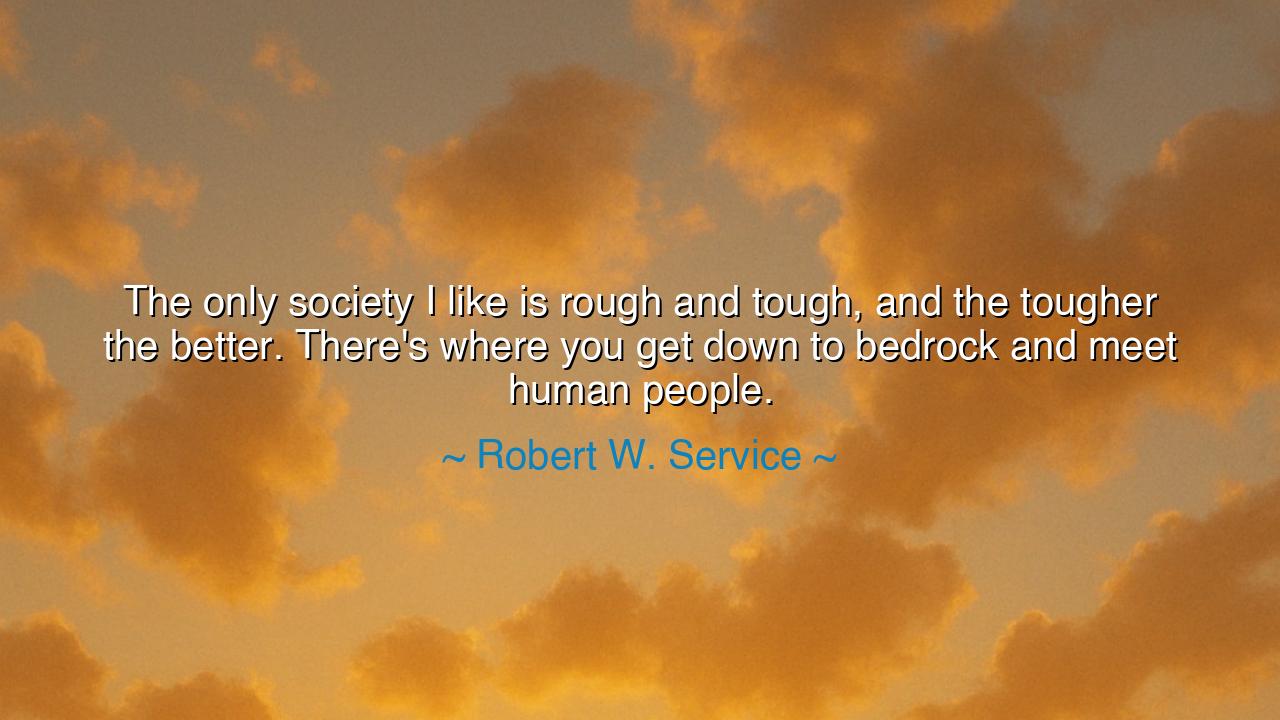
The only society I like is rough and tough, and the tougher the
The only society I like is rough and tough, and the tougher the better. There's where you get down to bedrock and meet human people.






The words of Robert W. Service, “The only society I like is rough and tough, and the tougher the better. There's where you get down to bedrock and meet human people,” are not merely the musings of a poet but the cry of a soul forged in wilderness and hardship. Service, the “Bard of the Yukon,” spoke for those who left behind the velvet halls of polite society and chose instead the raw frontier, where men and women were tested by snow, hunger, and solitude. His voice echoes the ancient truth: that in the rough and tough, when the comforts are stripped away, the masks fall, and one sees the bedrock of humanity—courage, endurance, and the unpolished truth of the human heart.
The origin of this quote lies in Service’s years in the Yukon, amid the miners, trappers, and wanderers who braved the harsh northern wilderness in search of gold and survival. He was no cloistered poet writing from safe chambers; he walked among those who struggled for life itself. There, he discovered what he names “human people”—not those adorned with titles or wealth, but those who revealed their souls in sweat, laughter, and hardship. For in the rough places of the world, there is no room for pretense. Hunger does not flatter, cold does not lie, and danger strips away the shallow pretenses of society.
History bears witness to this same truth. Consider the tale of Shackleton and his men on their doomed Antarctic expedition. Trapped in ice, without hope of reaching their goal, they endured two years of unimaginable hardship. In such a trial, it was not wealth or social standing that mattered, but loyalty, resilience, and courage. The men became brothers, stripped of all vanity. Shackleton’s leadership and the crew’s solidarity showed that in the toughest society, humanity’s truest face is revealed. They returned alive, not because of privilege or power, but because they had touched the bedrock of what it means to endure together.
Service, in his own way, offers a critique of what many call “civilized” society. For in the polished parlors and drawing rooms, he saw masks of politeness, ambition, and pretense. But he longed for the rough and tough, where men’s words matched their deeds, where survival depended on cooperation, and where people were valued not for appearances, but for strength, loyalty, and truth. His poetry sings not of the silk and marble of cities, but of the frostbitten camps and roaring rivers where men wrestled with nature and with themselves.
There is also a spiritual truth hidden here. For is it not in suffering, in hardship, that the soul is revealed? When life is easy, it is simple to wear masks and play roles. But when the storm comes, the heart is laid bare. In the furnace of trial, gold is purified; in the wilderness of adversity, character is proven. Service reminds us that to know the heart of humanity, one must step into places where comfort cannot shield, where difficulty presses hard, and where only the authentic remains.
The lesson for us, then, is profound: seek not always the soft and easy path, for it hides the truth of others and of yourself. Do not fear the rough and tough moments of life, for they bring you down to bedrock, where genuine strength and authentic fellowship are found. In hardship, you will discover who you are and who stands with you. In struggle, you will meet not the masks of society, but the human people who, like you, are fighting for meaning, survival, and dignity.
Practical actions flow from this wisdom. Do not run from challenges, but embrace them as opportunities to strip away illusion. Place yourself in situations where struggle and effort are required—whether in work, in service, or in adventure—for there you will discover the true measure of yourself and others. Build friendships not only in times of plenty, but in times of need, for those who stand with you in hardship are the ones who reveal their bedrock souls.
Thus, let Robert W. Service’s words endure: the society worth cherishing is not the false glitter of ease, but the fierce fellowship of those tested by adversity. The tougher the trial, the clearer the truth. And in that truth, you will find what is most precious—not gold, not glory, but the unbreakable bond of human people who live and endure together.






AAdministratorAdministrator
Welcome, honored guests. Please leave a comment, we will respond soon